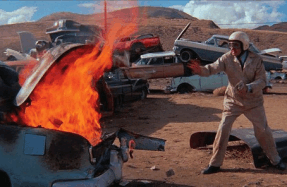Hollywood, Read

“I am not trying to make some new meaning from these films; I am striving to bring out the meanings that are there but obscured by the plot lines,” Thom Andersen writes of the method he employed for his film Juke: Passages from the Films of Spencer Williams (2015). Again and again, Andersen’s movies about movies—Red Hollywood (co-directed with Noël Burch, 1996), Los Angeles Plays Itself (2003), The Thoughts That Once We Had (2015)—repeat this action, like racking focus: suddenly drawing attention to something we had always seen onscreen but hadn’t paid attention to, excavating histories, geographies, and ideas we didn’t know we’d missed. Unsurprisingly, Slow Writing, the new collection of Andersen’s writings on cinema, is like his films: measured, political, a little bit ornery, striving to bring forward similarly obscured meanings (historical, formal, ideological, personal) from a likewise diverse body of sources.
Compiling Andersen’s trickle of program notes and unpublished essays from 1966 to 1994, as well as the comparative deluge of post- work from 2005 on (much of it published in this magazine, whose editor also blurbs the book), evinces a remarkably consistent set of concerns across the 50 years of its author’s thinking about cinema. As in Andersen’s films, his subject matter is eclectic and catholic, ranging from sexploitation flicks to Ozu Yasujiro, with stops
You’re reading a preview, subscribe to read more.
Start your free 30 days





